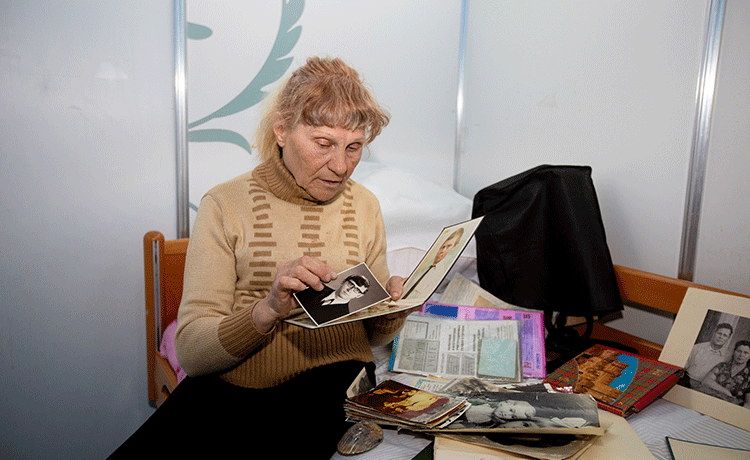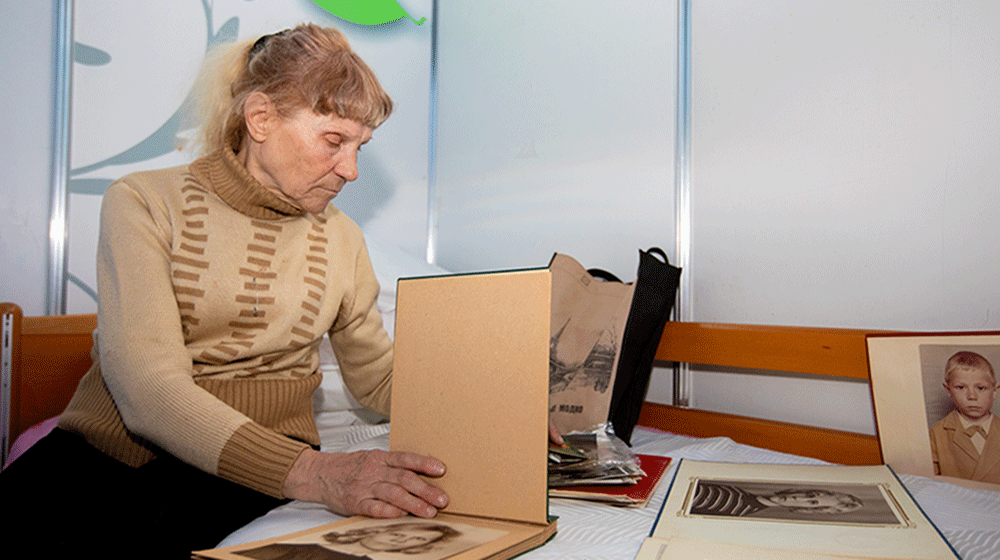MYKOLAIV, Ukraine – “There were explosions outside, it smelled of smoke. We were almost surrounded, planes were flying overhead. There was so much noise that I couldn’t hear myself speak. We decided to leave the next morning, if we made it through…”
In the midst of Russia’s bombardment of her hometown of Mykolaiv in southern Ukraine, 72-year-old Valentina Ejova made a decision that would divide her life into before and after. Over the course of a few hours, she packed up her belongings into two small suitcases and left her homeland, friends, and the world as she knew it behind.
According to the United Nations Refugee Agency, a quarter of the population of Ukraine have been forced to flee their homes since the invasion began on 24 February. Of these, more than 4.5 million have left Ukraine and a further 6.5 million are internally displaced within the country. As of 9 April 2022, nearly 400,000 had entered the Republic of Moldova since the start of the crisis, the majority of whom are women, children and older people.
“Even though my heart ached to leave, I fled my homeland without looking back – I decided that my life is worth more than the material goods I gave up,” Mrs. Ejova said.
Women, girls and older people are at heightened risk of exploitation and abuse during a crisis, especially while on the move, at border crossing points and in cramped and often insecure placement centres. For the elderly in particular, existing health and mobility issues make it harder to access already scarce health care and psychosocial support, especially when travelling alone and through conflict areas.
Even before the current crisis, older people in conflict-affected areas of Ukraine made up one third of those in need of humanitarian assistance – the highest proportion of elderly people affected by a crisis in the world. Ukraine also has one of the highest life expectancy gender gaps in the world, with women outliving men by an average of ten years: Many elderly women are escaping on their own, putting them at higher risk of sexual and physical violence and abuse.

The longest journey of her life
The trip from Mykolaiv to Chișinău, the capital of Moldova, would normally take around half a day; 24 hours after she closed her front door for what may be the last time, Mrs. Ejova had made it to the border. She first joined family friends in a car to Odesa, then after a long search for onward transport, found a minibus heading to Chișinău. The journey was arduous, most of it spent in cold, cramped conditions, alone and towards an uncertain destination.
“I have always led an active life, but that trip drained my strength – not so much physically, but emotionally. The fear of driving across minefields or being stopped never left me for a second,” Mrs. Ejova recalled.
She was able to breathe a sigh of relief only when she crossed the border. Once in the Republic of Moldova, she was given shelter at a temporary placement centre, where she had been for several days when she spoke to UNFPA. She told us that to her this country meant peace, help and kindness.
In both Ukraine and neighbouring countries hosting refugees, UNFPA is supplying medical equipment and referrals to health units, distributing dignity kits with hygiene and sanitary products, deploying mobile health teams, and providing shelters and a support hotline for gender-based violence survivors.
“Age is not a diagnosis – I am ready to face challenges in a new country”
Mrs. Ejova was grateful for the help she’d received so far in Moldova and was due to fly to Austria a few days later, which is currently hosting refugees arriving and transiting from Ukraine. This would be her first ever trip abroad, and although she didn’t know anyone there, she was confident she would find her place.
“I am 72 years old, yes, but I am ready to study a new language. I am ready to work and to get back on my feet. Age is not a diagnosis – I feel full of strength and energy, I am ready to face challenges in a new country.”
Her voice trembling as she leafed through snapshots of a world she’d left behind, she said, “I have to choose what to leave and what to take with me. I can give up clothes and shoes, but I don’t give up my photos – they are my life.”
After Mrs. Ejova’s husband passed away many years ago, she had lived with her 39-year-old son, who remained in Mykolaiv, which has been almost completely cut off from communication and Internet services. A few days earlier, her son had managed to phone to say he wanted to leave; she hasn’t heard from him since.
Mrs. Ejova arrived safely in Austria with just $78 in her pocket: The day before leaving Ukraine she had tried to withdraw money from several ATMs, but all were empty. Unsure whether she would ever see her homeland again, she remained hopeful and determined that in Austria she could find rest and peace.
“I want to do everything possible to bring my son to me. He is like his father, he rarely makes any sudden decisions. He is young – young people usually take such decisions more easily. In our case it was the other way around: I pray to be able to see him again.”



